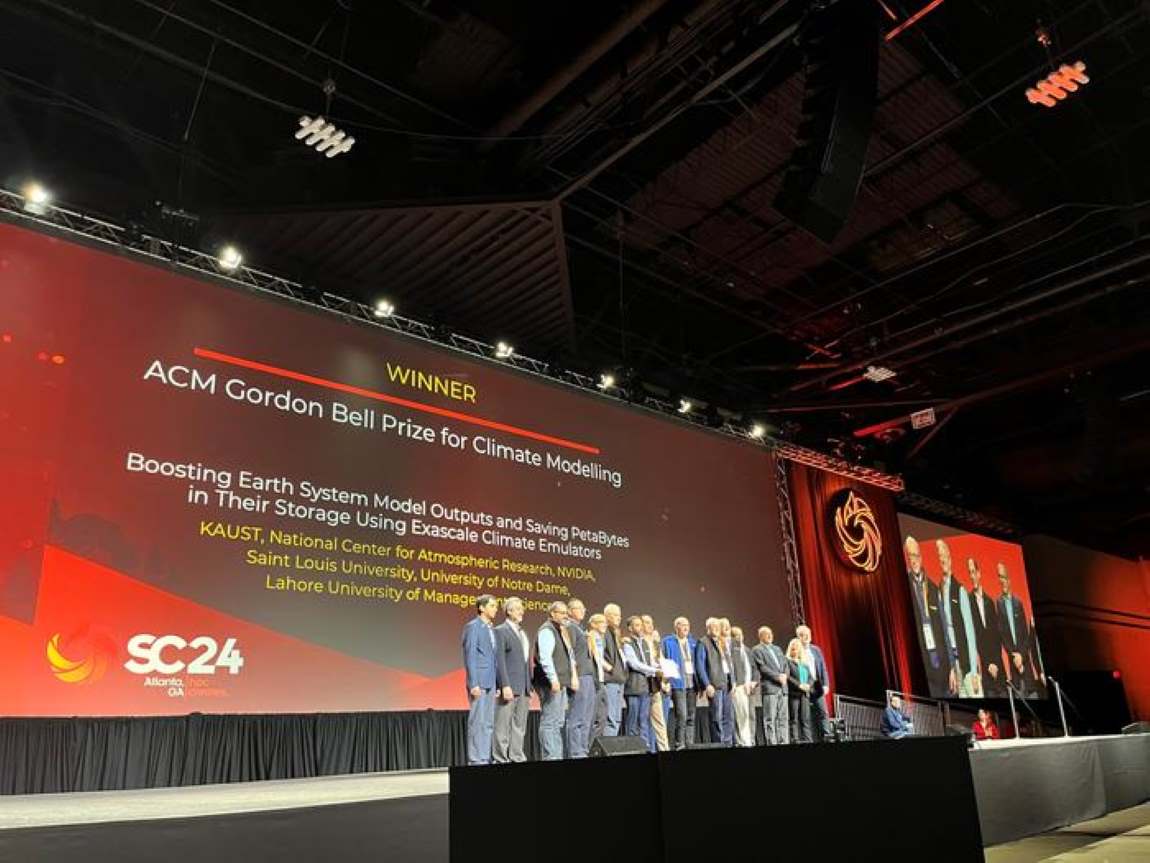Association for Computing Machinery – ACM, today, presented a 12-member team with the ACM Gordon Bell Prize for Climate Modelling for their project “Boosting Earth System Model Outputs And Saving PetaBytes in Their Storage Using Exascale Climate Emulators.” The award recognizes innovative parallel computing contributions toward solving the global climate crisis.
The members of the team are: Sameh Abdulah, Marc G. Genton, David E. Keyes, Zubair Khalid, Hatem Ltaief, Yan Song, Greorgiy L. Stenchikov and Ying Sun (all of King Abdullah University of Science and Technology, Saudi Arabia); Allison H. Baker (NSF National Center for Atmospheric Research, USA); George Bosilca, (NVIDIA, USA); Qinglei Cao (St. Louis University, USA); and Stefano Castruccio (University of Notre Dame, USA).
Scientists have warned that global warming, caused by the human use of fossil fuels, is reaching a crisis point. Experts assert that the prevalence of more intense storms, hurricanes, droughts, wildfires, as well as a loss of biodiversity, are signs that the crisis is worsening rapidly. They warn that, if not urgently addressed, global warming poses an existential threat to life on Earth.
Using computational tools to better understand the rate and impacts of climate change is considered a valuable tool in developing strategies to address the problem. While climate modelling has been a scientific practice since the 1950’s, recently introduced exascale supercomputers (which can process a quintillion calculations each second) offer the opportunity to understand climate change at a far more advanced level than ever before. With the use of exascale computers, computer scientists and climate scientists have developed extremely high-resolution Earth System Models (ESM’s).
ESM’s offer great promise in understanding the Earth’s climate but they are computationally expensive—i.e., they require a great deal of computation time and energy, and they require a tremendous amount of storage for the massive quantity of data they generate.
To address this problem, the prize-winning team presented the design and implementation of an exascale climate emulator for addressing the escalating computational and storage requirements of high-resolution Earth System Model simulations.
In computing, emulators allow for a dynamic interplay between different computers – with one computer system (called the host) behaving like another computer system (the guest). The growing use of emulators in climate modeling has become more common as emulators can combine and enhance efficient algorithms to handle large datasets, as well as the distribution of computations across multiple processors.
Climate emulators have come to play a pivotal role in alleviating the computational burden and storage requirements associated with climate modeling and simulations. Because the resolution of a climate model is impacted by the trade-off between the computational costs and the representation of the climate system, improving both computational and data storage challenges in a high-performance computer allows for more advanced climate modeling capabilities.
The ACM Gordon Bell Prize for Climate Modelling winning team contends their emulator could save several petabytes of computing storage space. By way of comparison, one petabyte is equal to the storage capacity of approximately 170 top-end servers.
The team’s ultra-high resolution model of the earth’s climate included 54,486,360 spatial locations around the globe, as well as 318 billion hourly and 31 billion daily observations.
The team achieved its results using high performance computing methods called Spherical Harmonic Transform (SHT) and Cholesky factorization. In the introduction to their paper, the Prize-winning team wrote: “We utilize the spherical harmonic transform to stochastically model spatio-temporal variations in climate data. This provides tunable spatio-temporal resolution and significantly improves the fidelity and granularity of climate emulation, achieving an ultra-high spatial resolution of 0.034◦ (∼3.5 km) in Space.”
The team ran mixed-precision computations on a PaRSEC dynamic runtime system, running on 9,025 nodes on Frontier, 1,936 nodes on Alps, 1,024 nodes on Leonardo, and 3,072 nodes on Summit, with the hybrid Flop/s rates 0.976 EFlop/s, 0.739 EFlop/s, 0.243 EFlop/s, and 0.375 EFlop/s, respectively.
The team concludes that their exascale climate emulator holds significant potential for the climate community, advancing climate research and policy making. They also maintain that their work holds significant potential in advancing the development of machine learning (ML) and AI-driven methods for forecasting or prediction applications in climate science.
The ACM Gordon Bell Prize for Climate Modelling was presented during the International Conference for High Performance Computing, Networking, Storage and Analysis (SC24), which is being held November 17 – 22 in Atlanta, Georgia.
Article Source:
Press Release/Material by Association for Computing Machinery (ACM)
Featured image: The members of the team are: Sameh Abdulah, Marc G. Genton, David E. Keyes, Zubair Khalid, Hatem Ltaief, Yan Song, Greorgiy L. Stenchikov and Ying Sun (all of King Abdullah University of Science and Technology, Saudi Arabia); Allison H. Baker (NSF National Center for Atmospheric Research, USA); George Bosilca, (NVIDIA, USA); Qinglei Cao (St. Louis University, USA); and Stefano Castruccio (University of Notre Dame, USA). Credit: Association for Computing Machinery




